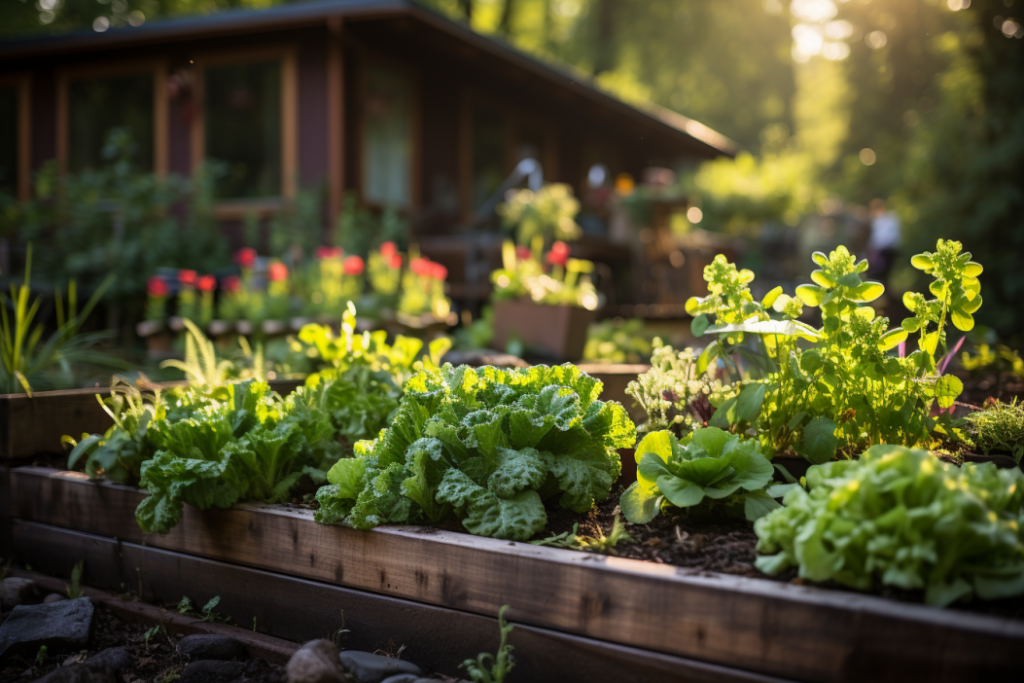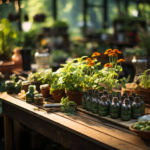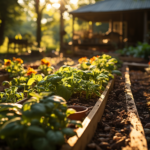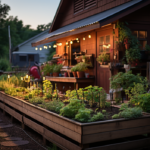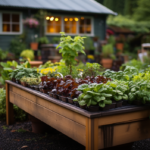Table of Contents
Say Goodbye to Harmful Chemicals: Discover 10 Safe and Eco-Friendly Techniques to Protect Your Kitchen Garden From Pests
Gardening can be a peaceful and satisfying experience until nasty pests start destroying your plants. We all want to protect our kitchen garden from pests, but the thought of using potentially harmful chemicals around the plants seems risky. Fortunately, there are organic pest control methods that are just as effective. In this article, we will introduce you to ten natural and safe ways to tackle unwanted pests in your kitchen garden. These methods not only keep your plants healthy, but they also ensure the environment is safe for humans and animals. Say goodbye to chemical pest control solutions and hello to eco-friendly, organic methods!
Simple and Safe Pest Control Solutions
Pests in your kitchen garden can be an absolute nightmare! Not only can they damage your hard work and beautiful plants, but they can also carry dangerous diseases. Luckily, there are simple and safe solutions you can use to keep your garden pest-free.
Remove Infested Plants
If you notice any plants that are already infested with pests, it’s best to remove them from the garden straight away. Infested plants can spread pests to other plants in the garden, which can quickly cause a major problem.
Companion Planting
Companion planting is where certain plants are grown together, and they help to repel pests. For example, basil can repel mosquitoes and flies when planted close to tomatoes. Nasturtiums can protect against aphids when planted with beans, cucumber, or cabbage.
Beneficial Insects
Beneficial insects such as ladybugs, butterflies, and bees can help eradicate pests in your garden. Ladybugs can control aphids, while bees help pollinate plants and attract predators such as birds that may feed on harmful pests.
Diatomaceous Earth
Diatomaceous Earth is a fine powder made of fossils that can be sprinkled around plants to protect them from pests. The powder scratches the exoskeleton of insects like aphids and earwigs, causing them to dry out and die.
Conclusion
Having pests in your kitchen garden can be disheartening, but by implementing simple and safe pest control solutions, you can protect your plants while keeping the environment and your family safe. By using a combination of methods such as companion planting and beneficial insects, you can keep your garden free from pests without resorting to harmful chemicals. Try these safe and organic methods today and enjoy watching your garden thrive!
Introduce Beneficial Insects to Your Garden
Did you know that not all insects are harmful to your plants? In fact, some insects can actually help your garden thrive by preying on the harmful ones. This method of pest control is known as biological control and involves introducing beneficial insects to your garden.
Here are a few beneficial insects you can introduce to your garden:
- Ladybugs: These cute little bugs consume aphids, mites and other insects that feed on the leaves and stems of your plants.
- Lacewings: Known as the “aphid lion,” lacewings are predator insects that feed on aphids and other small insects.
- Praying Mantis: These insects are fierce predators that consume a variety of harmful pests including caterpillars, flies, mosquitoes, and beetles.
Introducing beneficial insects is a simple and safe way to control pests in your garden. Insects like ladybugs and lacewings can be purchased in bulk and released into your garden. You can also attract them naturally by planting certain types of flowers that they are attracted to.
It’s important to note that while these insects are safe for your garden, they may also consume the eggs and larvae of other beneficial insects like butterflies and bees. Therefore, it’s important to use biological control in moderation and only when necessary.
By introducing beneficial insects to your garden, you can reduce the need for harmful chemicals and pesticides. Not only is this method safer for your garden, but it is also more environmentally friendly. In addition to introducing beneficial insects, there are many other organic pest control methods you can try to keep your kitchen garden thriving.
Use Neem Oil to Repel Pests
Neem oil has been used as an insecticide for centuries, and it is a great natural solution to keep your garden free from harmful pests. Neem oil contains a natural chemical called azadirachtin that disrupts the life cycles of insects by preventing their growth and ability to reproduce. It also works as a repellent to keep future generations of insects at bay. Here are the steps to using neem oil as a pest control for your garden:
- Mix the oil – Mix two tablespoons of neem oil with a gallon of water, and add a mild soap or detergent to act as a surfactant.
- Spray the mixture – Spray the mixture on the leaves of your plants, covering the back and front sides. Make sure to spray early in the morning or late in the evening to avoid heat damage to the plants.
- Repeat every two weeks – Repeat the spray every two weeks until the pest problem is under control.
One thing to note about neem oil is that it is not selective in which insects it kills- it may affect beneficial insects like bees and butterflies. So be sure to apply it in moderation and only to areas where pests are present. Neem oil is also harmful to fish, so avoid using it near ponds or water sources.
Using neem oil is a safe, organic, and effective way to get rid of pests in your garden. It’s an admirable alternative to harsh chemical pesticides that can harm the environment and your health. With regular neem oil application, you can protect your garden and keep it pest-free throughout the growing season.
Create a Barrier with Diatomaceous Earth
Maintaining a kitchen garden is a rewarding experience, but it comes with many challenges, including the constant battle against pests. While there are several harmful products available in the market that guarantee an instant solution, it is always safe to opt for organic and natural pest control methods. One such method is using Diatomaceous Earth (DE), an organic material that is highly effective in controlling various types of pests.
What is Diatomaceous Earth?
Diatomaceous Earth is a dust-like substance made of fossilized remains of diatoms. Diatoms are tiny aquatic organisms that have a hard shell made of silica. These shells are the main ingredient of DE, which is a natural, organic, and non-toxic substance that is safe to use in a kitchen garden.
How Does Diatomaceous Earth Work?
DE is safe for humans and animals, but it can be lethal for insects. When pests come in contact with DE, it penetrates their exoskeleton, causing them to dehydrate and die. This makes it an effective pest control method that is safe, easy to apply, and long-lasting.
How to Use Diatomaceous Earth in Your Kitchen Garden
Here are some steps to follow while using Diatomaceous Earth in your garden:
- Choose a dry and calm day to apply DE. Avoid using it on a windy or rainy day as it may be blown away.
- Wear gloves and a mask while using DE to avoid inhaling it.
- Sprinkle a thin layer of DE surrounding your plants, focusing on the base of the stem and the soil.
- Reapply Diatomaceous Earth after rainfall or as and when needed.
In conclusion, by creating a barrier with Diatomaceous Earth, you can effectively control pests invading your kitchen garden. It is an eco-friendly, organic, and safe alternative to chemical pesticides that keeps your plants healthy and thriving.
Employ Crop Rotation Techniques
Growing the same vegetables in the same spot year after year can lead to declining soil quality and increase the risk of pest infestations. Crop rotation is a simple and effective method to avoid both of these problems. Here’s how:
- Understand Crop Groups: Organize plants into different groups based on their characteristics and nutrient requirements. Examples of vegetable families include the Brassica family (cabbage, cauliflower, broccoli), Solanaceae family (tomatoes, peppers, eggplants), and the Legume family (beans, peas).
- Rotate Plants in Different Groups: Avoid planting vegetables from the same family in the same spot twice in a row. This prevents pests from building up in the soil and also helps maintain soil quality as different plants require different nutrients.
- Practice Intercropping: Intercropping involves planting different crops at the same time, and it’s an effective method to disrupt the habitat of pests. Choose plants that are repellent to common garden pests or ones that attract beneficial insects. For example, planting onions alongside carrots helps deter carrot rust fly, while growing marigolds alongside tomatoes attracts ladybugs that eat aphids.
Crop rotation also offers additional benefits such as reduced soil erosion and improved water usage. Proper crop rotation management will benefit your garden’s health and help you minimize pest invasions without resorting to chemical treatments.
Natural Pest Control with Neem Oil
Neem oil is a natural and effective pest control solution that has been used for centuries. It’s made from the seeds of the neem tree, found primarily in India, and is an environmentally friendly option to many conventional pesticides. Here’s how to use neem oil to control pests:
- Prepare Neem Oil Spray: Mix 1-2 tablespoons of neem oil into a gallon of water, along with a small amount of mild soap to help the oil stick to insects. Stir the solution and then spray it over the plants and surrounding soil in your garden.
- Repeat Routine Treatments: Regular treatment is needed to get the most out of neem oil’s pest control effectiveness. Apply neem oil spray once a week or after heavy rain to keep pests away.
Neem oil works by disrupting the hormone systems of insects, preventing them from growing and reproducing. It’s effective against a wide range of garden pests such as whiteflies, aphids, and mealybugs.
Protect Your Garden with Diatomaceous Earth
Diatomaceous earth (DE) is a naturally occurring sedimentary rock that’s made up of fossilized diatoms. It’s a popular pest control solution because it’s organic and non-toxic to humans and pets. Here’s how you can use DE:
- Sprinkle DE Around Garden Beds: Apply a light dusting of DE on the soil surface around your garden beds. This creates a barrier that pests such as slugs, snails, and beetles won’t cross.
- Dust Plants with DE: Apply a light dusting of DE directly to plant leaves to prevent insects from damaging them.
DE works by penetrating the exoskeletons of insects, causing dehydration and death. It’s important to purchase food-grade DE for your garden to ensure that it’s safe for consumption.
In conclusion, crop rotation, neem oil, and diatomaceous earth are just a few of the natural and organic methods that you can use to control pests in your kitchen garden. By utilizing these methods, you can keep your plants thriving and avoid dangerous chemical treatments.
Use Essential Oils to Keep Pests at Bay
Essential oils offer a fantastic blend of pleasant aromas and pest control benefits for your kitchen garden. They are safe, eco-friendly, and won’t harm your plants or the environment. Here are some essential oils that work well as pest repellents:
- Peppermint oil: It repels aphids, ants, beetles, caterpillars, and spiders.
- Clove oil: Clove oil has excellent antifungal, antiseptic, and insecticidal properties. It deters ants, mosquitoes, and garden pests.
- Lemongrass oil: It’s a natural insect repellent that keeps flies, mosquitoes, and other garden pests away.
- Eucalyptus oil: It repels several pests like ants, beetles, and flies.
How to use essential oils:
- Mix a few drops of your chosen essential oil with water and spray the solution on your plants.
- Place cotton balls with a few drops of essential oil in strategic locations around your garden.
- Plant pest-resistant herbs like lavender or rosemary to keep the bugs away.
- Soak bamboo skewers in essential oils solution and place them in the soil to deter aphids and other pests.
By using essential oils to keep pests at bay, you can enjoy a healthy, beautiful garden without worrying about the negative effects of chemical pesticides. Essential oils not only keep pests away, but they also give your garden a fresh, aromatic scent. By practicing non-toxic pest control, you’re creating a healthy environment for your plants, which means a more abundant and beautiful crop. So why not try out essential oils for your garden pest control today?
Try Companion Planting to Deter Pests
Companion planting is a method whereby you plant specific plants next to each other to achieve two different outcomes. Some plants have natural insect-repelling qualities, while others lure beneficial insects that prey on common garden pests. By planting them together, you can reduce the number of pests in your garden without having to use chemicals. Here’s how you can effectively use companion planting to deter pests:
Identify the Pest: Know which insects pose a threat to your plants. Different pests will be drawn to different companion plants.
Choose the Right Companion Plants: Plant companion plants that are natural repellents for the particular pests you want to keep away. For instance, marigolds and chrysanthemums can repel aphids and nematodes, while basil and thyme repel mosquitoes and flies.
Start Small: If you’re new to companion planting, it’s essential to start small and learn what works and what doesn’t in your garden. Start by planting companion plants around your vegetable starter plants.
Companion Planting Combinations: Some companion plants don’t thrive when planted next to specific plants, so it’s necessary to consider companion planting combinations that work best. For example, basil planted next to tomatoes results in a healthier tomato plant, while planting beans with beets improve the performance of both plants.
Companion planting is a natural and inexpensive method to control pests, and it can significantly benefit your garden. Planting the right companion plants can enhance the flavors and nutrient value of your vegetables while keeping them pest-free.
Use Homemade Sprays to Control Pests
When it comes to organic pest control, homemade sprays can be a godsend. They are easy to make, environmentally safe, and cost-effective. Here are some of the most efficient sprays to keep pests at bay:
- Garlic spray: Garlic contains sulfur compounds that repel insects. You can make a garlic spray by blending a bulb of garlic with two cups of water. Allow it to sit overnight, strain the liquid, and then add half a teaspoon of dish soap. Spray it on your plants every couple of days.
- Chili pepper spray: Spicy peppers contain capsaicin, which irritates the pests and keeps them away. To make a chili pepper spray, puree four to five hot peppers with two cups of water. Add a tablespoon of dish soap and let it sit overnight. Strain the mixture and then use it as needed.
- Tomato leaf spray: Tomato leaves contain alkaloids, which are toxic to some pests. To make a tomato leaf spray, steep two cups of tomato leaves in four cups of water overnight. Strain the liquid and add a tablespoon of dish soap to it. Spray the mixture on your plants every few days.
- Oil spray: A mixture of oils can suffocate the pests by clogging their breathing holes. To make an oil spray, combine two cups of vegetable oil with one tablespoon of dish soap. Shake the mixture well and then dilute it with a gallon of water. Spray it on your plants every week.
Homemade spray solutions can be a quick and efficient way to get rid of pests in your garden without using any harmful pesticides. While they are effective, it’s essential to keep in mind that they can also harm beneficial insects in your garden. Therefore, use these sprays in moderation and only when necessary. Always test a small area of your plants before spraying the whole plant to ensure there are no adverse effects. With a little effort and patience, you can keep unwanted pests at bay while maintaining the health and safety of your kitchen garden.
Set Up Traps and Barriers to Keep Pests Away
Setting up traps and barriers is a great way to prevent pests from destroying your kitchen garden. Here are a few organic pest control methods you can use to keep pests away:
- Sticky Traps – Sticky traps are an eco-friendly way to stop pests in their tracks. These traps are non-toxic and use a sticky adhesive to capture and kill pests. Sticky traps are especially effective against flying pests, such as aphids, fruit flies, and whiteflies.
- Physical Barriers – Physical barriers, such as netting, can protect your plants from pests. Cover your plants with a fine mesh netting to keep insects and birds away. This method will allow air and light to still reach your plants, while keeping pests at bay.
- Beer Traps – Beer traps are a simple and effective way to control slugs and snails. Simply bury a shallow dish filled with beer into the ground near your plants, and the pests will be attracted to it and drown in the beer.
- Copper Tape – Copper tape is a good deterrent for pests that like to climb on stems, such as slugs and snails. The tape produces an electric charge when touched, which deters these pests away.
- Row Covers – Row covers are protective blankets that shield your plants from pests and weather. These covers allow air, light, and water to reach your plants while keeping pests, such as aphids, cabbage moths, and root maggots, away.
Keeping your kitchen garden free of unwanted pests doesn’t have to come at a high environmental cost. By setting up traps and barriers, you can protect your plants from pests without the use of harsh chemicals. Whether you choose physical barriers or sticky traps, these organic pest control methods are sure to help you maintain a healthy and thriving garden.
Use Natural Bug Repellents on Your Plants
When it comes to pest control, chemical insecticides have been the go-to solution for many gardeners for a long time. However, with the increasing awareness of the harmful effects of chemicals on the environment and human health, organic pest control methods are gaining popularity. One such method is using natural bug repellents on your plants.
What Are Natural Bug Repellents?
Natural bug repellents are made from natural ingredients that are safe for plants, humans, and other beneficial insects. These repellents work by repelling pests or making the plants less attractive to them. Some common natural bug repellents include garlic, onion, hot peppers, and essential oils.
How to Make Natural Bug Repellents?
The good news is that you can make natural bug repellents at home with a few easy steps. Here are some DIY natural bug repellents that you can try:
- Garlic and Chili Pepper Spray: Blend some garlic and chili peppers and mix with water. Pour the mixture into a spray bottle, and it’s ready to use.
- Essential Oil Spray: Mix a few drops of essential oil (eucalyptus, peppermint, lavender, or clove) with water and spray it on your plants.
- Neem Oil Spray: Mix neem oil with water and a few drops of dish soap. Shake well and spray it on your plants.
These are just a few examples of natural bug repellents that you can easily make at home. To find the right recipe for your plants and pests, you may need to do some experimentation.
Benefits of Using Natural Bug Repellents
Here are some advantages of using natural bug repellents on your plants:
- Safe for Plants: Unlike chemical insecticides, natural bug repellents do not damage your plants.
- Safe for Humans and Other Beneficial Insects: Natural bug repellents are also safe for humans, pets, and beneficial insects.
- Easy to Use: You can easily make natural bug repellents with ingredients that you already have at home.
Using natural bug repellents on your plants is a safe and effective way to control pests in your kitchen garden. By incorporating this method into your organic pest control routine, you can ensure healthier plants and a safer environment.
Conclusion
In conclusion, safe and effective organic pest control methods are available to keep your kitchen garden vibrant and free from harmful chemicals. From introducing beneficial insects and employing crop rotations to using homemade sprays and natural bug repellents, there are numerous ways to keep pests at bay. These methods are environment-friendly and do not pose any negative effects on your plants or soil quality. Explore these alternative pest control strategies and protect your kitchen garden without putting your health or the environment at risk. Gardening is a fun and fulfilling hobby, and with these ten organic pest control methods, you can enjoy the bountiful results of your labor without worrying about nasty pests damaging or destroying your plants.

